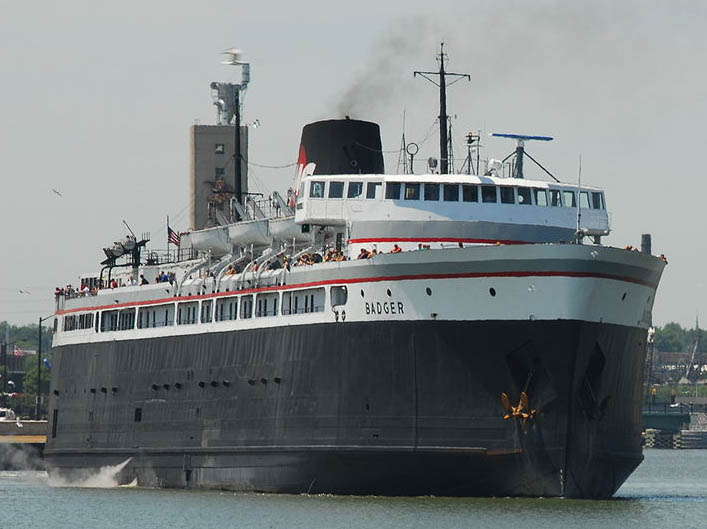The SS Badger is a passenger and vehicle ferry that has been operating on Lake Michigan since 1953. Currently, the ship travels 62 miles (100 kilometres) between Ludington, Michigan, and Manitowoc, Wisconsin, connecting U.S. Highway 10 (US 10) via water between the two cities. It is the last coal-fired passenger ship on the Great Lakes. Badger travels across Lake Michigan in about four hours, covering 60 miles on average (97 km). The SS Badger rarely misses a sailing due to inclement weather.
The ship is named after the athletic teams of the University of Wisconsin, the Wisconsin Badgers. Badger operates on Michigan time (the Eastern Time Zone, as opposed to Wisconsin’s Central Time Zone), and passengers pay Michigan taxes on their fares. From May to October, it operates on a seasonal basis.
The Christy Corporation of Sturgeon Bay, Wisconsin, built Badger as a rail car ferry in 1952, along with its twin SS Spartan (named after the mascot of Michigan State University) with a reinforced hull for ice-breaking. It was originally used all year to transport railroad cars, passengers, and automobiles between the two sides of the lake.
The Chesapeake and Ohio Railway launched the SS Badger on September 6, 1952, and it entered service on March 21, 1953. (from 1973 a subsidiary of the Chessie System). With the purchase of the Pere Marquette Railway in 1947, the C&O acquired the rail car ferry operations in Ludington. After 1972, service was gradually reduced; all but three of the newest vessels were retired, and sailings to Milwaukee and Manitowoc, Wisconsin, were cancelled, leaving only the route between Ludington and Kewaunee, Wisconsin. The Chessie System ended its car ferry service on July 1, 1983, when it sold the steamers Badger, Spartan, and City of Midland 41 to Glen F. Bowden of Ludington. To continue the operation, he formed the Michigan–Wisconsin Transportation Company (MWT). During the 1980s, the railroad car ferry concept on Lake Michigan ran into serious financial difficulties, and by November 1988, Badger was the only vessel operating. It was the last of the 14 ferries based in Ludington still in operation. Bowden laid up Badger on November 16, 1990, facing bankruptcy, ending 93 years of railway car ferry service out of Ludington and 98 years on Lake Michigan overall.

The Badger was sold to Interlake Steamship Company in December 2020. Also included in the transaction were the barge Pere Marquette 41 and the SS Spartan. Interlake’s headquarters are in Middleburg Heights, Ohio. On July 9, 1991, the three ferries were purchased by entrepreneur, philanthropist, and Ludington native Charles F. Conrad of Holland, Michigan after sitting idle for a year. He undertook a major overhaul and refit of Badger solely for the purpose of transporting passengers and automobiles.
Because the SS Badger is the last coal-fired passenger ship on the Great Lakes, she was chastised by the Environmental Protection Agency (EPA) and environmental groups in late 2008 for dumping untreated coal ash from its boilers directly into Lake Michigan. When 55 short tons (49 long tons) of coal are burned per day, 4 short tons (3.57 long tons) of ash are produced. Badger’s propulsion system produces coal ash as a byproduct.
In March 2013, Lake Michigan Carferry signed a consent decree with the US Department of Justice and the EPA to end ash discharge within two years by implementing a new ash retention system. In September 2013, the revised consent decree was filed. Work on a conveyor system that stored ash in four containment bins on board began in January 2015. A new combustion control system was built to allow the ship to burn less coal and produce less ash, making it more efficient. Badger has been retrofitted to no longer discharge ash into the lake and then was cleared to return to service. The ash is now unloaded and is being used to make cement.







